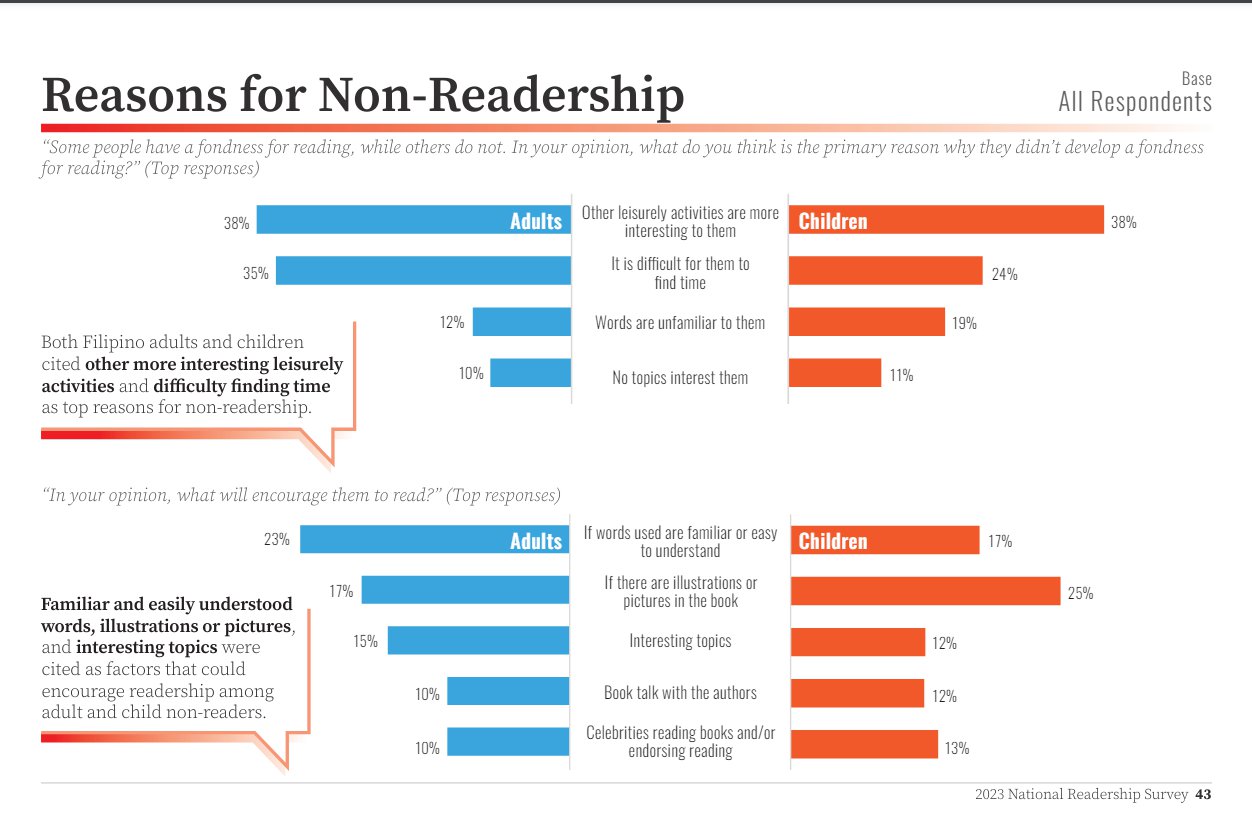Physical Address
304 North Cardinal St.
Dorchester Center, MA 02124
Physical Address
304 North Cardinal St.
Dorchester Center, MA 02124

Reading literacy in the Philippines is crucial in shaping the country’s educational landscape and socioeconomic development. However, despite efforts to promote reading, a significant portion of the population still struggles with reading or lacks interest in reading. In this article, we will explore some factors contributing to the challenges of reading literacy in the Philippines and discuss potential solutions to address them.
One of the key points from the 2023 National Readership Survey (NRS) conducted by Social Weather Stations (SWS) is to identify why some Filipinos are not inclined toward reading. The reasons include other more interesting hobbies, lack of time, difficulty understanding the texts or the words used, and lack of interest in the book’s subject. Survey participants were also asked how they could be encouraged to read more, and responses included a better understanding of the text, using pictures or illustrations, and having a good story. With this information, the local publishing industry gains a clear basis and ideas for improving the production of books that can potentially change the minds of those who prefer other hobbies.

One of the primary challenges facing reading literacy in the Philippines is the limited access to books and reading materials, particularly in remote and underserved communities. Many schools and public libraries lack sufficient resources to provide students with a diverse selection of books, leaving them with limited opportunities to develop their reading skills.
Socioeconomic factors also play a significant role in shaping reading habits and literacy rates in the Philippines. Families living in poverty may prioritize basic needs such as food, shelter, and healthcare over investing in books and educational resources. As a result, children from low-income households often have limited exposure to reading materials and may struggle to develop strong reading skills.
The Philippines is a linguistically diverse country, with over 180 languages spoken across its regions. While Filipino and English are the primary languages of instruction in schools, many students come from indigenous or minority language backgrounds, making it challenging to access reading materials in their native languages. This language barrier can hinder their reading comprehension and overall literacy development.
Despite the importance of reading literacy, there is a prevailing lack of reading culture and engagement in Filipino society. Many Filipinos view reading as a chore rather than a pleasurable activity. This mindset leads to low motivation and interest in reading. Additionally, the rise of digital entertainment and social media has competed for people’s attention, further diminishing the appeal of reading among the younger generation.
To improve reading literacy in the Philippines, we must enhance access to books and reading materials, particularly in underserved communities. This includes investing in school libraries, establishing community reading centers, and providing mobile libraries to reach remote areas. By making books more accessible, individuals of all ages can develop a love for reading and improve their literacy skills.
Addressing socioeconomic inequities is essential for promoting reading literacy in the Philippines. Government agencies, NGOs, and community organizations can collaborate to provide book subsidies, literacy programs, and educational resources to disadvantaged communities. Additionally, initiatives such as book donation drives and literacy outreach programs can help bridge the gap and ensure that every child has the opportunity to access quality reading materials.
Recognizing the Philippines’ linguistic diversity, it is crucial to support multilingual education initiatives that cater to students’ diverse language backgrounds. Schools can integrate indigenous languages and cultural materials into their curriculum, fostering a sense of identity and pride among students. Furthermore, efforts to translate and produce reading materials in various languages can help promote literacy and reading engagement across different communities.
Promoting a culture of reading and engagement requires collaborative efforts from schools, families, communities, and the media. Schools can organize reading events, book fairs, and author visits to inspire students and create excitement around reading. Parents and caregivers can also play a crucial role by reading to their children, providing access to age-appropriate books, and serving as positive reading role models. Additionally, the media can promote literacy through book recommendations, author interviews, and literary discussions, fostering a culture where reading is valued and celebrated.
Improving reading literacy in the Philippines is a multifaceted endeavor that requires collective action and commitment from various stakeholders. By addressing the challenges of limited access to books, socioeconomic barriers, language diversity, and lack of reading culture, we can create a more inclusive and literate society where every Filipino has the opportunity to develop strong reading skills and fulfill their potential. Let us work together to cultivate a love for reading and empower future generations to become lifelong learners and critical thinkers.
For more information about readership in the Philippines, download the 2023 Readership Survey.